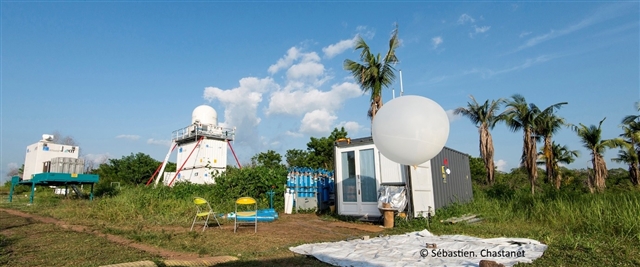Work Packages
WP1 - Boundary Layer Dynamics
Project Lead: Dr Norbert Kalthoff
The structure of the atmospheric boundary layer (ABL) depends mainly on the energy exchange at the Earth’s surface. However, due to the high natural and anthropogenic emissions in Southwest Africa, gaseous and aerosol air pollutants also affect the diurnal cycle of the ABL, as do sea breeze and monsoon flows from the Gulf of Guinea.
More details >
WP2 - Air Pollution and Health
Project Lead: Dr Cathy Liousse
Air pollution both inside and outside causes a range of health impacts. In this work package measurements and modelling will investigate the impact of industrial and domestic activities on air quality and health.
More details >
More details >
WP3 - Atmospheric Chemistry
Project Lead: Dr Céline Mari
Industrial and domestic emission from West African cities are blown over the agricultural and forested land. Here the emissions are transformed through chemical and physical processes where they can transform into other pollutants like ozone, acids and aerosols. This work package will investigate these processes through measurements and modelling.
WP4 - Cloud-Aerosol Interactions
Project Lead: Prof Hugh Coe
Aerosols produced by human activity can impact sunlight by directly scattering it or by impacting the nature of clouds. By acting as cloud condensation nuclii aerosols can change the number and size of cloud droplets and so change their precipitative and radiative properties. This work package will link the observations made by the aircraft with the meteorological modelling.
More details >
More details >
WP5 - Radiative Processes
Project Lead: Dr Christine Chiu
Radiative processes strongly influence synoptic-scale evolution and climate change. However to accurately predict them you need to knowing the properties of the surface and of gases, clouds, precipitation and aerosols in the atmosphere. This work package will investigate our ability to make these prediction both from field data and from models.
WP6 - Precipitative Processes
Project Lead: Prof Andreas Fink
Rain plays a central role in the economy of West Africa. Both energy and food production in the region relies upon the rain fall. Improvements in forecasting of weather has a range of benefits for the region. How this rainfall changes with changing human influence is the focus of this work package.
More details >
WP7 - Monsoon Processes
Project Lead: Prof Peter Knippertz
The West African monsoon brings the seasonal rains to West Africa. It plays a significant role in determining the annual changes in life in the region. However, out understanding of this region is poor. Climate models predict a range futures for the monsoon which makes planning for the future difficult. This work package aims to bring together the research from other work packages to investigate the future on the monsoon.
 Project Lead: Dr Norbert Kalthoff
Project Lead: Dr Norbert Kalthoff Project Lead: Dr Cathy Liousse
Project Lead: Dr Cathy Liousse Project Lead: Dr Céline Mari
Project Lead: Dr Céline Mari Project Lead: Prof Hugh Coe
Project Lead: Prof Hugh Coe Project Lead: Dr Christine Chiu
Project Lead: Dr Christine Chiu Project Lead: Prof Andreas Fink
Project Lead: Prof Andreas Fink Project Lead: Prof Peter Knippertz
Project Lead: Prof Peter Knippertz